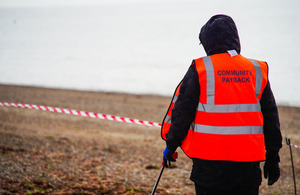Offenders help turn the tide against beach litter
Offenders will be put to work to pay back the communities they have harmed as part of a week-long nationwide clean-up of Britain’s coastline.

-
offenders clean up coastline as part of Great British Beach Clean
-
hundreds of offenders carry out hard graft to repay communities
-
part of £93 million worth of extra funding to increase unpaid work hours
Plastic and litter will be removed by offenders wearing high-visibility jackets emblazoned with “Community Payback” on beaches up-and-down the country, as part of the Marine Conservation Society’s annual Great British Beach Clean.
This builds on the government’s commitment to give communities a greater say in how justice is served.
The Probation Service has partnered with several major organisations with a focus on outdoor unpaid work projects to improve the quality of life of neighbourhoods blighted by anti-social behaviour and allow the public to see justice being done.
Its work with the Marine Conservation Society will see offenders carry out more than a thousand hours of unpaid work in just ten days in coastal areas including Kent, Northumberland and Norfolk.
In March, the government published its Anti-Social Behaviour Action Plan. Focused on stamping out these crimes, the plan sets out how Community Payback can make offenders pay for their crimes.
Prisons and Probation Minister, Damian Hinds, visited Hayling Island in Hampshire to see offenders putting in hours of hard graft for the benefit of the local community.
Prisons and Probation Minister, Damian Hinds, said:
The government is coming down hard on the anti-social behaviour which makes other people’s lives a misery.
We want offenders visibly atoning for their crimes in a way which benefits the law-abiding majority and this work also helps protect our beautiful coastline.
The Marine Conversation Society will log the recovered rubbish and use the data gathered to help them understand the main pollutants and focus their fight to protect the British coastline.
Jennifer Mitchell, Director of Engagement and Communications at the Marine Conservation Society, said:
We’re pleased to see offenders making a difference to their communities and environment by contributing to our work.
Clearing our beaches of litter is not only a great way to give back to society, it also helps us tackle ocean pollution by gathering vital data.
Information on what is washing up on our beaches, like wet wipes or plastic bottles, is analysed by scientists and helps us campaign for change for cleaner seas and a healthier planet.
Each year courts hand down more than 50,000 Unpaid Work requirements to punish offenders for crimes including theft, criminal damage and alcohol-related incidents.
The government is investing up to £93 million extra into Community Payback which will see offenders completing millions of unpaid work each year to improve the environment and revitalise our towns and cities.
This year marks 50 years since the launch of the first Community Payback project after the first unpaid work placement was ordered by a judge at Nottingham Crown Court on 2 January 1973.
Notes to editors:
- The Marine Conservation Society’s Great British Beach Clean runs from 15 - 24 September.
- The Anti-social Behaviour Action Plan sets out the Government’s approach to stamping out anti-social behaviour and restoring the right of people to feel safe in, and proud of, their local area.